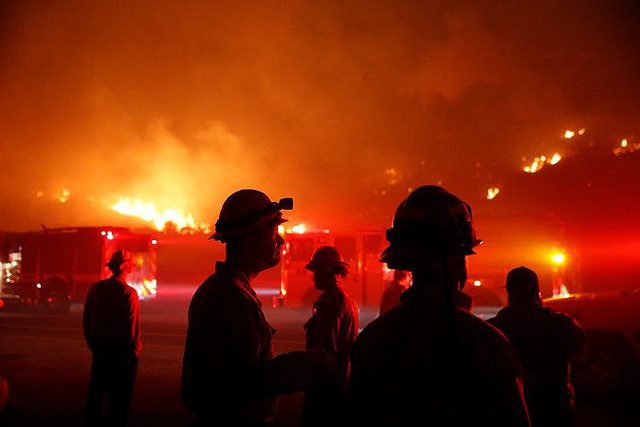by Amanda Reardon, Captain –
 It was a Tuesday night, and I was watching the news before turning in. 2006 had barely begun, but if this was any indication of what the year would be like, it would be a year to remember. I felt such joy and gratitude in my heart, I was compelled to drop to my knees beside my bed and praise God. Twelve miracles in one night. Of course, I didn’t know any of the West Virginia miners, but I was elated by the news that was being reported–– twelve of the thirteen were alive.
It was a Tuesday night, and I was watching the news before turning in. 2006 had barely begun, but if this was any indication of what the year would be like, it would be a year to remember. I felt such joy and gratitude in my heart, I was compelled to drop to my knees beside my bed and praise God. Twelve miracles in one night. Of course, I didn’t know any of the West Virginia miners, but I was elated by the news that was being reported–– twelve of the thirteen were alive.
I picked up my journal and wrote about how the world was aware of the presence of God. Reporters were talking about prayer and faith, and how a miracle had occurred. America had begged God for that miracle. For a few precious moments, it seemed as though the whole country believed in God’s power and love.
I put my journal down and went to sleep. My husband had to stay up late to finish some work, so I left a light on for him. At about two in the morning, I rolled over and was awakened by the light. I was alone; why wasn’t Rob in bed yet? I went downstairs to find out. “They’re dead,” he said. “The miners are dead. I can’t tear myself away from the television.”
I dreamt about the miners over and over, and in the morning I wasn’t even sure if they had really been found dead, or if it was only a dream I’d had. Oh, how I hoped it was only a dream! But as the sleep wore off, my mind became clearer, and I knew it was real.
The first blow came in that many people had lost loved ones that night. But the second blow was that we were wrong about the miracle. When I went to bed Tuesday night I was amazed and delighted that God had made himself so obvious. A nation prayed. God responded. No one could miss that. But it wasn’t true––God didn’t give us the answer we wanted. He had not shown us his face.
I still don’t really get it. Why doesn’t God do something so spectacular that it erases all doubt of his existence and strength and love? Even when he sent his Son, his mode was subtle. Not everyone picked up on the fact Jesus was God Incarnate. Born in a stable, son of a carpenter….I’m not so sure I would have picked up on it either.
I have lots of ideas for how God could reveal himself to us. Saving the miners would have been quite high on my list, to be sure. But I’m not God. Isaiah 55:8 says, “‘For my thoughts are not your thoughts, neither are your ways my ways,’ declares the Lord.” His thoughts are higher than ours, the passage goes on to explain. We tend to want an explanation for what God does. But why should he have to explain? Why should we have to comprehend? For some reason––HIS reason––he decided to come to earth humbly. For some reason––HIS reason––he decided not to save the miners. His reasons are right; his decisions are best.
I’m sure it hurt God to let the miners die. When we suffer, God doesn’t simply observe from above. He is with us, in the midst of our pain. He was under the earth with the miners. He was in the chapel with the family members. As their hearts ached, so did his. Why did Jesus weep, even as he was probably planning to raise Lazarus from the dead? He wept because he shared in Mary and Martha’s suffering. Though he had the power to change everything (and in that case, he did!), he still felt human pain. Our God is not aloof.
In his book, Suffering: A Test of Theological Method, Arthur McGill writes: “(The Christian knows) that the sufferings of this present age are not worth comparing to the glory which God shall reveal. (Rom. 8:18) Therefore, he rejoices. The Christian can know joy in connection with sorrow, but only because he knows the power of God is overcoming the power of evil.” (p.117) I know that the sorrow the miners’ families feel is very great. But I also know it is far greater for the families (if any) who do not embrace the gospel message. Christians may truly suffer, but their sorrow is always laced with hope. We understand that all we know in this life is temporary, and when we reach our permanent residence, there will be no more sorrow.
Claiming such a notion takes faith. And the subject of faith might just bring my thoughts full circle today. I asked why God didn’t show himself in clearer ways. Genesis 15:6 tells us that it was Abram’s faith that was “credited… to him as righteousness.” For God’s own reasons, it is faith that matters. He doesn’t always want us to see, he wants us to believe.
When God seems distant and maybe even unreal, our faith will carry us through. When we hurt and grieve and writhe, our faith will carry us through. Some may say “that’s naïve,” but God says, “that’s righteous.”












